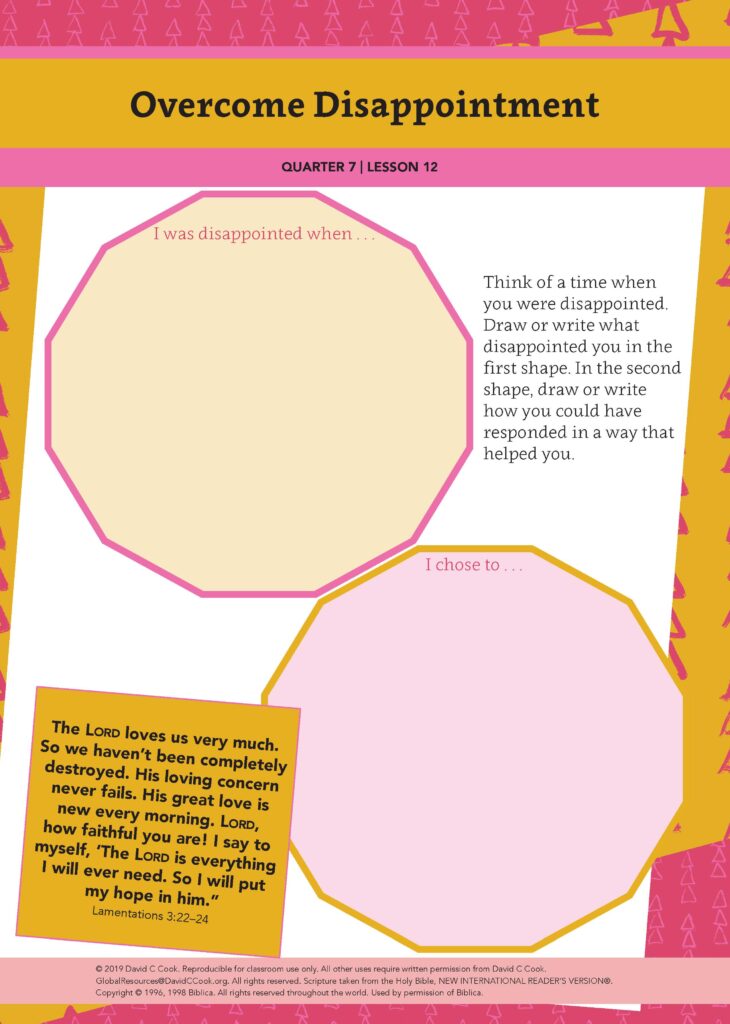During the lesson, the information for you to know is written in regular type, and what we suggest speaking or reading aloud to children is in bold. All resources for this lesson, including the Teacher Guide, Student Page, Family Connection Card, and other resources can be downloaded in a ZIP file by clicking on the following link:
In some lessons you will find "resource articles." These are articles written by experts from around the world to help equip you for your work with children and adolescents. Share them with parents or guardians if you consider it appropriate.
The Lord loves us very much.
So we haven’t been completely destroyed.
His loving concern never fails. His great love is new every morning.
Lord, how faithful you are! I say to myself,
“The Lord is everything I will ever need.
So I will put my hope in him.”
Lamentations 3:22–24
Disappointment is a normal but difficult part of life. Disappointment causes us to feel upset, angry, or frustrated. It is healthy for us to recognise and talk about these feelings. When we feel disappointed, we can remember God’s love for us and look to His loving concern that never fails.
Think of something you hoped for recently that did not happen. How did you respond? Talk to God about how you feel. Tell Him what happened and whether you think you responded appropriately. Ask Him to help you when you are disappointed. Remember His love and concern for you. Thank Him for His unfailing love and for being everything you need!
Encourage families to talk to their children about a disappointment they have experienced. Ask them to talk about whether anything good came from the situation and how they handled it.
Teacher Tip: If possible, email or text the Family Connection Card to the families of your students.
Greet the children as they come to class. As each child enters, say something about her that focuses on God’s truth. For example, you may say, “God made you in wonderful ways” or “You are a special treasure.”
Today, we will talk about what happens when things do not go the way we hoped. Listen to these 3 stories.
As you tell the stories, pause after each one to ask the question, allowing 2–3 children to answer.
Let’s begin with Anthony. Anthony was looking forward to celebrating a holiday with his family. On this day, they would dress up and go into town for a special festival. His family would eat good food, dance, and listen to good music. Anthony has been looking forward to the festival all week. But he wakes up with a fever. His mum says he cannot go to the festival because he is sick.
Answers may include: He feels sad that he cannot go to the festival. He feels angry that he had to get sick on this special day.
Anthony probably feels sad, angry, or both because he really wanted to go to the festival.
Next let’s hear about Mary. She has been working hard at school to receive a special award. Even though Mary works hard on her school work, she does not get the award. Her friend receives it instead.
Answers may include: She feels sad that she will not receive the award. She feels jealous of her friend for getting the award. She feels hopeless because she cannot work any harder.
Finally, listen to Peter’s story. Peter’s family is planning to move into a better house. The house they live in is very small and needs many repairs. Although they have been looking forward to moving, something happens, and they cannot move into the new house. They must stay in their small house for now.
Answers may include: He feels sad that he is not able to move. He feels hopeless because he thinks that he will never move to a better house.
In each story, the children are disappointed. Disappointment is when something that you want to happen does not happen. Disappointment can make you feel sad, angry, or hopeless. Everyone experiences disappointment at one time or another. How you handle disappointment is your choice.
Sometimes big disappointments come into our lives. We expect good things to happen and bad things happen instead. Disappointment is a part of life, but the Bible tells us it is not a reason to lose hope.
Optional: If possible, share the image from The Action Bible.

Read these verses directly from your Bible.
The Lord loves us very much. So we haven’t been completely destroyed. His loving concern never fails. His great love is new every morning. Lord, how faithful you are! I say to myself, “The Lord is everything I will ever need. So I will put my hope in him.”
Lamentations 3:22–24
Allow 2–3 students to respond to the following questions. If the children do not raise their hands to answer, you may read the verses again.
The Lord, God, loves us very much. God cares about us. He is faithful. He is everything we need.
We can put our hope in the Lord—God.
These verses come from a true story in the Bible about God’s people, the Israelites. In this story, the Israelites had a lot to be disappointed about. God had led them to the land He had promised them, a city that was called both Jerusalem and Zion. The Israelites had been living in this city happily when it was invaded and destroyed!
The people thought they would live long lives in this city, but they were very disappointed to find out they were wrong! Many of the people were taken to a city called Babylon.
The prophet Jeremiah talks about what happened in our true Bible story. He walked through the streets and saw crumbled ruins where a beautiful city had once been. The Bible tells us that Jeremiah cried about this sad situation. It is normal to feel sad when we are disappointed. The people of Israel were in danger of losing hope when their city was destroyed. Listen to what Jeremiah says about this situation:
City of Jerusalem, what can I say about you? What can I compare you to? People of Zion, what are you like? I want to comfort you. Your wound is as deep as the ocean. Who can heal you?
Lamentations 2:13
Has something bad ever happened to you instead of the good things you were expecting? How did this make you feel?
Allow 2–3 children to respond.
Even though Jeremiah was sad, angry, and disappointed, he found hope in the Lord. Listen again to what he said:
The Lord loves us very much. So we haven’t been completely destroyed. His loving concern never fails. His great love is new every morning. Lord, how faithful you are! I say to myself, “The Lord is everything I will ever need. So I will put my hope in him.”
Lamentations 3:22–24
There are 4 things we learn about how to handle disappointment from this story. Follow me as we do a motion to help us remember each thing.
Let’s review what we can do to help us when we are disappointed. When I say one of these, do the motion that goes with it.
Think about what you will do the next time you are disappointed.
Raise your hand if you would like to share something you were disappointed about.
Allow 2–3 children to share.
Optional: If you are using Student Pages, allow 3 minutes for each child to write or draw their responses.

Not everything will go the way we want it to all the time. Sometimes situations disappoint us. It is okay to feel sad or angry when this happens. To help us to live lives that are full of hope, we need to deal with our disappointment. Let’s talk about what we can do when we are disappointed.
Have the children sit in a circle. Pick up a ball and join the circle.
Let’s talk about some of the things that disappoint us. In a moment, we will gently throw this ball across the circle for someone to catch. When you catch the ball, you will name something that has disappointed or could disappoint you. After you speak, gently throw the ball to someone else in the circle. We will continue doing this activity for 3 minutes.
If a child is unable to think of something disappointing, allow the child to pass the ball to a friend who is willing to help him. Have the child repeat what the friend says before continuing with the game. Pause the game after 3 minutes.
Let’s stop for a moment while the person with the ball holds on to it for us. We will continue passing the ball around the circle, but now, we will talk about the things that can help us when we feel disappointed. You can give a specific example, or you can say one of the things you learned in our lesson.
Give the children 3 minutes to continue passing the ball. If a child does not know what to say, you may repeat the ways of dealing with disappointment outlined in the lesson. They are: Remember that God’s love never fails. Focus on the positive. Talk to someone about how you feel. Draw a picture about what happened.
Dealing with disappointment so that we can feel good and be hopeful is not easy. Some disappointments are big and make us feel like giving up. And even small disappointments can discourage us. Our memory verse reminds us to focus on the good things in our lives.
If you are using the Memory Verse Poster, show it to the students.
Finally, my brothers and sisters, always think about what is true. Think about what is noble, right and pure. Think about what is lovely and worthy of respect. If anything is excellent or worthy of praise, think about those kinds of things.
Philippians 4:8

Sing or chant this verse using the following motions. If you changed any of the motions in previous lessons, use the motions you created.
Have the children sing or chant with you as you repeat the words to the memory verse 3 times. End class by saying this blessing, based on Lamentations 3:22–24, over the children.
Blessing: God loves you very much. When you are disappointed and need help, may you talk to God and remember His love and care for you.
Lead the children in singing this quarter’s song, if possible.
Life on Life ©2020 David C Cook. Reproducible for home or classroom use only. All other uses require written permission from David C Cook [email protected]. All rights reserved.